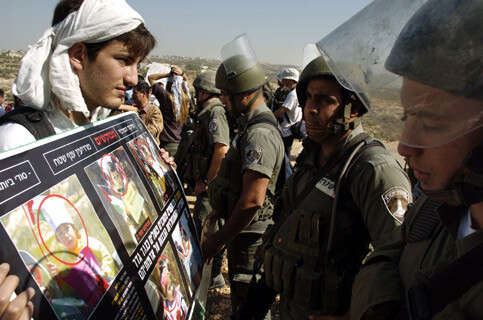
A demonstration against the separation wall in the West bank village of Balin October 28, 2005. (Photo: MAANnews/Mushir Abdelrahman)
The United Nations General Assembly should be more innovative in its approaches to the question of Palestine, Israel should distinguish between military objectives and civilians and the Palestinian Authority should control Palestinian armed groups so as to stop violence against civilians, a Special Committee says in a new report.
The three-member Special Committee to Investigate Israeli Practices Affecting the Human Rights of the Palestinian People and Other Arabs of the Occupied Territories recommended that the General Assembly “think of innovative ways to fulfil its responsibility with respect to all aspects of the question of Palestine until this question is resolved in conformity with relevant United Nations resolutions and norms of international law, and until the inalienable rights of the Palestinians are fully realized.”
Among the actions the Assembly should take is to monitor implementation of the advisory opinion of the International Court of Justice (ICJ) asking Israel to comply with its legal obligation to cease building its separation barrier in the Occupied Palestinian Territory (OPT), including in and around East Jerusalem, and to make sure that no other State is helping Israel with the project, the Committee says.
The Government of Israel should respect the applicability of the Fourth Geneva Convention governing the protection of civilian populations in wartime to OPT and the occupied Syrian Golan “and distinguish in all circumstances between military objectives and civilian persons and objects.” It should also cease extra-judicial killings and stop destroying Palestinian property and confiscating large areas of Palestinian land, it says.
The Palestinian Authority should apply the provisions of the Fourth Geneva Convention and “exert control over Palestinian armed groups in such a way that they refrain from any act of violence against civilians.” In accordance with international standards, it should also bring to justice those responsible for planning or participating in attacks against Israeli or Palestinian civilians.
The Committee, established in 1968 and comprising representatives of Sri Lanka, Malaysia and Senegal, noted that for 37 years Israel has denied it access to the Occupied Palestinian Territory (OPT) and wondered “whether Israel should not revisit the reasons behind such refusal.”
“Disagreement should not be a hindrance to meeting and interacting; discussing issues of common concern will not affect the legal state of affairs,” it said.
From 25 June to 9 July, the Committee said, it interviewed 46 witnesses from Palestinian and Israeli non-governmental organizations (NGOs) and individuals from Syria in Egypt, Jordan and Syria.
To download the full report (PDF) click here.
Related Links